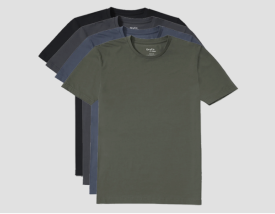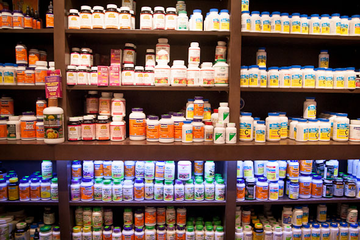Homeopathic medicine is all the rage these days, and many hyperhidrosis sufferers are looking to treat their sweating with natural remedies. That includes the use of nutritional supplements for excessive sweating. But that raises the question: do vitamin and mineral supplements have an effect on the condition? And does hyperhidrosis even have a nutritional component? This post will take a look at these questions.
Are Vitamins & Minerals Among the Best Natural Remedies for Hyperhidrosis?
Fighting back at hyperhidrosis with vitamins and minerals is a good place to start IF deficiencies are to blame. It goes back to the principle of attacking the problem at the root. If you’re lacking a particular vitamin or mineral and a deficiency of that compound can make you sweat too much, then a supplement may help. You should address a micronutrient deficiency anyway, regardless of whether you have symptoms or not.
The tricky part, however, is not determining whether you have a deficiency or not - a simple blood test panel will reveal your levels. The hard part is knowing whether a particular vitamin or mineral deficiency is the exact cause of your hyperhidrosis.
With that being said, we carried out some research to find if there are supplements for excessive sweating and we dug up a few standouts.
Supplements for Excessive Sweating: The Most Valuable Players
Green Tea
A time-tested natural herb that humans have consumed for millennia, green tea has demonstrated “antiperspirant” properties. When consumed daily, it detoxifies the body, reducing its need to sweat. It also contains a rich micronutrient profile that balances the nervous system so that the sweat glands are activated less.
Sage
Aromatherapy enthusiasts are familiar with sage and love it for its calming effects. Sage is also nutrient-dense and an excellent detoxifier, which means your body will sweat less to remove toxins. It also balances hormones that can trigger excessive sweat production.
Chamomile
Like green tea and sage, chamomile is a calming herb that also acts as an astringent (constricts body tissues). It constricts the sweat glands so that you don’t sweat excessively and it even doubles down as a deodorant.
Clover
Clover bears a chemical resemblance to sage in that it contains phytoestrogens, compounds which help keep your hormones balanced. With that said, balanced hormones help to keep sweating under control, which can lead to hyperhidrosis relief (assuming hormonal imbalance is a contributor).
St. John’s Wort
St. John’s Wort is well known as a natural alternative to antidepressant medications, and is commonly used by those who suffer from mood disorders. It alters the production of neurotransmitters, some of which can affect sweat production, and has shown some positive effects on hyperhidrosis. But caution is warranted using this herb since the wrong dosage can have serious side effects.
Valerian Root
Valerian root has received praise for its anti-anxiety and sleep-promoting effects. It can also reduce the effects of menopause and body temperature issues, making it a great solution for secondary hyperhidrosis. The jury is still out for primary hyperhidrosis though.
Witch Hazel
This oddly-named herb has demonstrated some ability to keep excessive sweating at bay. When applied topically in affected areas, it blocks the pores that release sweat, so that you stay drier, longer.
Astragalus & Schisandra
These two herbs are a little more obscure but commonly used in traditional Chinese medicine (TCM) as a supplement for excessive sweating. They do so by regulating the hormones and keep the mind calm during stressful situations.
Remember this when seeking supplements for excessive sweating: your mileage may vary. The biochemistry of every human being on this planet is different, and what will seem like a magic bullet for your friend may be a dud for you (or make you sick) and vice-versa. So the key takeaway for using supplements for excessive sweating is to have realistic expectations beforehand, and to use them judiciously.
Can a Mineral or Vitamin Deficiency Cause Excessive Sweating?
One thing most doctors and researchers agree on when it comes to hyperhidrosis, is that the exact cause of it is largely unknown. The biggest running theory right now is that an overproduction of the neurotransmitter acetylcholine causes excessive sweating. Of course, nutritional deficiencies have been suggested as a possible cause and research has made some connections, albeit indirect ones.
The Sunshine Vitamin’s Involvement in Excessive Sweating
Vitamin D is one of the most vital compounds required for optimal functioning, and yet many of us are deficient in it. Lack of sunlight, poor nutrition and genetic abnormalities can make it hard for our bodies to get enough of it.
An overlooked effect of vitamin D deficiency is its impact on sweat production. Dr. Michael Holick, M.D., vitamin D specialist at Boston University Medical Center has identified a sweaty head as one of the earliest warning signs of vitamin D deficiency (although rare).
The Energy Vitamin’s Involvement in Excessive Sweating
Vitamin B12 has become a designer compound of sorts in recent years. Everyone ranging from Hollywood celebrities to fitness moms have touted the vitamin - especially when delivered as an injection - as a panacea. It’s used as an energy booster (hence why you’ll find it energy drinks), a weight loss aid and much more.
When it comes to excessive sweating, however, there seems to be a connection. One report noted several cases of adult patients (middle-aged and elderly) who found relief of excessive sweating after receiving vitamin B12 injections. Most of these patients had pre-existing conditions though, and the report concluded that its relation to hyperhidrosis was still a mystery. However, they hypothesized that a deficiency in vitamin B12 could affect nerves that activate sweat glands.
The Master Mineral’s Involvement in Excessive Sweating
Unless a test has cleared you for it, there’s a good chance you’re deficient in magnesium. That’s not a jab at your eating habits - studies have shown that up to 75% of Americans are deficient, a number that’s likely to be similar worldwide. Poor soil quality and the consumption of magnesium-deprived foods is a big reason why our tanks are running low. This is a problem, of course, considering magnesium is a cofactor in more than 300 life-sustaining enzyme systems (hence why it’s been called The Master Mineral).
Does magnesium have an effect on excessive sweating? Yes and no. There doesn’t appear to be strong evidence of magnesium deficiency causing excessive sweating. However, it’s well-known that excessive sweating can lead to a deficiency since magnesium escapes the body as we sweat.
But here’s another twist: magnesium restricts sweat glands, meaning they will release a lighter volume of sweat when exposed to the mineral. And three of the supplements for excessive sweating mentioned above - green tea, sage and chamomile - are rich in magnesium. Go figure. Even if there isn’t strong evidence to show that a deficiency of magnesium causes sweating, it definitely looks like getting a little more of The Master Mineral can provide some relief.
Should You Take Supplements for Excessive Sweating?
You can take a nutritional supplement to treat excessive sweating as long as you are cleared by a doctor and buy from the best sources. Taking supplements for excessive sweating on your own can be a waste of money at best, and risky to your health at its worst.
First and foremost, make sure to visit your doctor for regular checkups. A blood panel (along with other tests) can identify a deficiency in essential vitamins and minerals. If you have a noticeable deficiency, then your doctor may recommend taking a supplement for it. This may or may not have an effect on your hyperhidrosis.
Another reason why it’s essential to speak to your doctor about supplements for excessive sweating, is to know whether they might interfere with medications you’re already taking. For example, green tea is a seemingly harmless herb; that is until you take an anticoagulant drug such as Aspirin. Taken together, these two otherwise safe compounds can lead to significant clotting/bleeding issues.
These kinds of interactions aren’t common knowledge, so you should always speak to your doctor if you are taking certain medications before buying a supplement. At the very least, you should do some research as well to educate yourself on supplement/drug interactions.
Finally, if you’re going to buy a supplement for excessive sweating, make sure to buy one produced by a reputable brand. Many of the capsules, powders and tinctures available at health food stores contain fillers and additives that can negatively affect your body over time. Some, when tested, barely contain the mineral or vitamins they claim to have! So make sure to do your research beforehand by reading online reviews and reviews of products. You can also research sites such as ConsumerLab or Labdoor, which provide reports on the quality of supplements made by particular brands.
Additional Reminders on How to Stop Excessive Sweating Naturally
Will a natural supplement for excessive sweating cure you of hyperhidrosis? Most likely not. It may offer some relief or augment other treatments, but it won’t be a cure-all. With that said, true relief comes from having the right combination of habits and approaches to treatment in place.
A supplement is great, but you should have the essential four pillars in place: a healthy diet, adequate sleep, plenty of exercise and good stress management. Also, don’t rule out other hyperhidrosis treatment options such as medications, antiperspirants and even iontophoresis. Lastly, convenient, non-invasive and cost-effective “hacks” such as a sweat proof shirt can do wonders to keep you dry and comfortable if you sweat.
Invest some time, effort and a little money into finding your ideal combination, even if that means adding a nutritional supplement in the mix. That’s the most tried and true method to overcoming hyperhidrosis.
Looking for more tips to help you keep hyperhidrosis under control? Check out our NEAT Freaks blog for more insights on staying dry.











